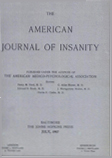STUDIES CONCERNING THE ACTION OF DILANTIN
Abstract
1. Dilantin treatment is accompanied by a decrease of serum-proteins.
2. The decrease corresponds quantitatively to the therapeutic effect.
3. There is a diminution of total protein in the blood serum. It is not equal in all fractions of the proteins, since it is the globulins which are more consistently decreased. In consequence of this the albumin-globulin ratio in group II, III and IV is increased in spite of the general diminution; and the ESR shows a slackening, an unusual phenomenon, because it is usually an increase which corresponds to a decreased protein value.[See Source Pdf for Table VIII and Table IX]
Sometimes these changes may develop in a relatively short time. We present in Table IX the case of a female, age 20, whom we examined before treatment and again seven weeks after the successful use of dilantin, grains 1½, administered three times daily. Here we meet a reduction of the total-proteins by one gramme per cent, that is, about 18 per cent of the original value after seven weeks. It is important to point out that the actual diminution of the proteins in all columns seems to indicate a substantial loss.
That is why we believe that the decrease of body-weight is caused partly by a loss of water because of the reduced osmotic power of the diminished serum-proteins and partly by a real loss of tissue.
As mentioned above, the influence of dilantin in children and adolescents differs from the findings in adults. In these, there is never a loss of body-weight in cases successfully treated by dilantin. On the contrary there is some gain in weight. Since these facts can be explained only by vague hypothesis, we refer the question to further investigation.
Access content
To read the fulltext, please use one of the options below to sign in or purchase access.- Personal login
- Institutional Login
- Sign in via OpenAthens
- Register for access
-
Please login/register if you wish to pair your device and check access availability.
Not a subscriber?
PsychiatryOnline subscription options offer access to the DSM-5 library, books, journals, CME, and patient resources. This all-in-one virtual library provides psychiatrists and mental health professionals with key resources for diagnosis, treatment, research, and professional development.
Need more help? PsychiatryOnline Customer Service may be reached by emailing [email protected] or by calling 800-368-5777 (in the U.S.) or 703-907-7322 (outside the U.S.).



